#tony stark meta
Text
besides the well-known fact that tony stark's arc reactor literally powered his heart and symbolised his second chance at life, it's been not just alluded to but clearly stated by marvel from the very first iron man film that it represents his heart:

this point is made very clear again when it's used to portray his death:

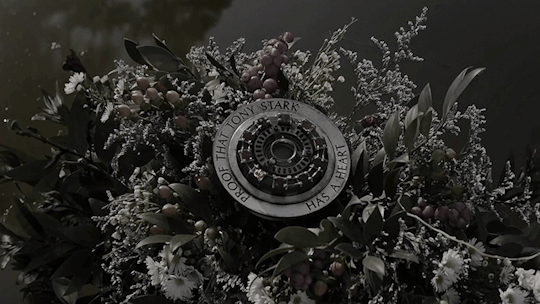
of course they did this; they're such obvious metaphors that are easy to rely on for beautiful visual storytelling. they undoubtedly were aware of the potential for these scenes and carefully considered them since the beginning.
but you don't really get to use each of these moments more than once if you want them to matter, so they had to choose which one of tony's stories needed to be told through carefully picked parallels.
and who did they use them on?
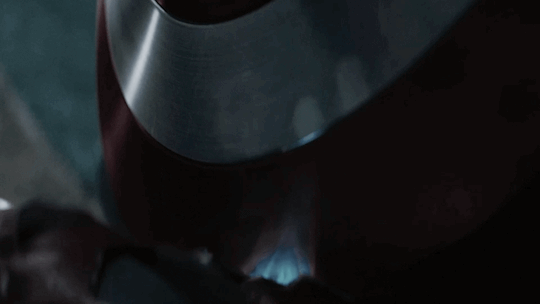
yup, that's right. steve rogers. steve, who literally ends their painful fight by breaking his heart.
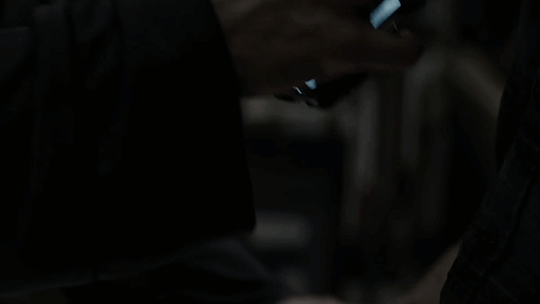
steve, whom tony literally hands his heart and says "here, take this" while he's devastated, disappointed, and at one of the lowest moments of his entire life.
so, platonic, romantic, alterous — the intricacies of his feelings don't even matter. they're only for tony to know.
but what we as an audience know, what we were explicitly told by marvel, is that the feelings tony had for steve were so strong that they were the equivalent of getting his heart actually shattered into pieces, and being reduced to offering your desperate, mourning heart on a platter as a way of saying "take it all, there's nothing left of me that you don't own now".
these were not accidents. we were meant to understand how profound his feelings were. so many things spiraled out of their falling out — the entire universe's faith was at stake as a result. tony was not indifferent to him. his problem was that he felt too much.
tony's achille's heel was always steve rogers, and that will forever be the backbone of the marvel universe.
#gifs by soliloquent#my colouring#tony my beloved#stevetony#stevie baby#tony stark#steve rogers#iron man#captain america#mcu gifs#marvel#mcu#stony gifs#captain america civil war#avengers endgame#steve and tony#stony#character insight#tony stark meta#steve rogers meta#stony meta
2K notes
·
View notes
Text
Tony and transhumanism
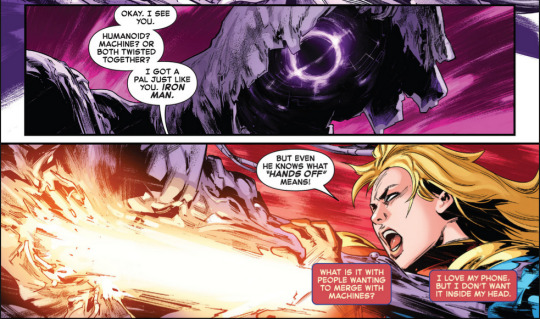
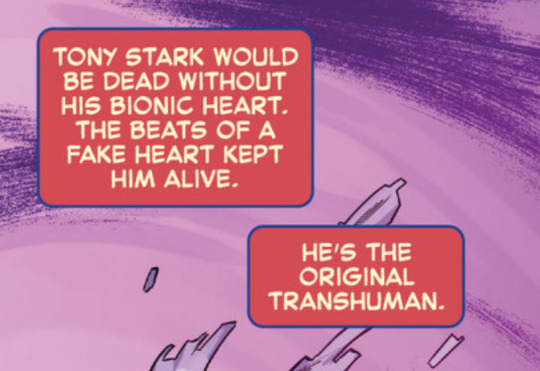
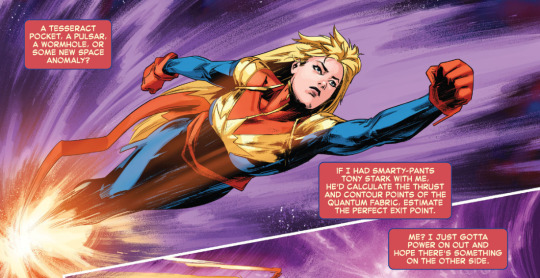
Tony Stark mentions in Captain Marvel: Dark Tempest (2023) #3.
Setting aside the “even HE knows what hands-off means”, it's interesting to me that when faced with a humanoid-machine blend, Carol's mind goes to Tony. She says that Tony was the original transhuman, and well, he maybe wasn't the first in the marvel universe, but he got his first synthetic heart in Iron Man #19 (back in 1969!), and transhumanism has been a part of his story arc for a long time. Some examples on the top of my mind (I know there are more, this is not an exhaustive list):
-When Tony had an implant in his mind to remotely control the armour while he was paralyzed in volume 1.
-His fight with the sentient armour in volume 3, and the end of it, when it gave him its heart (Iron Man vol.3 #30). And fully replaced Tony's heart with its own "mechanical bio-physiology". An artificial heart that was still implanting itself into Tony and fixing his broken ribs in issue 31 (body horror much??).
-Extremis, of course, which to me is the height of Tony's path to transhumanism. It's one of the two logical conclusions to his search to always perfect Iron Man and himself. Either make his body machine, or forgo the body entirely (looking at the three different Tony Stark AIs Tony has made). Extremis is especially good to me because of how he made himself the perfect blend of man and machine. Tony had until then always had recurring problems with his heart and other physical disabilities, and with Extremis he was finally past that "flaw". He was stronger, could heal, but more importantly, his mind was faster and better. I think he never came closer to erasing the line between Tony Stark and Iron Man than he did then. There was so much potential for this story beat, but Civil War and Dark Reign kind of ruined it. I really wish we could have had Extremis for longer, and really explore the classic "what makes one human" "man vs machine" and other transhumanist questions with Tony. Oh well. As an aside, it's interesting to me that Superior Iron Man decided to bring Extremis back. Clearly to him that was the next step of evolution, or in his words, what made him a god. If we push the analysis further, does this mean that regular Tony has developed an aversion to Extremis and what it entails? Maybe some left-over trauma from the Civil War and brain deletion?
-The repulsor node in Tony's chest after he was brought back. That controlled his brain. And also the bleeding edge armour that Tony casually put into his bone marrow. You know. Like one does.
-The fact that Tony apparently was experimenting on his biology and body and that that was the only reason Carol didn't kill him at the end of Civil War II. And then the fact that he managed to bring himself back to life and synthetize a new body.
-The Tony Stark AI that ran around during Secret Empire. Who made himself drunk, and also remembered Civil War somehow, and had all of Tony's character traits and regrets (see Secret Empire (2017) #6). I know it's probably an error on the writer's part, but I choose to believe that somehow this artificial version of Tony really remembers the Civil War. On top of AI Tony acting and thinking like the flesh and blood one, everyone around him really treated him like the "real" Tony. Hydra Steve even said that Tony downloaded his consciousness into the AI. Making it essentially Tony. I don't know where I'm going with this but I have Feelings about AI Tony.
-The whole mess of Tony Stark: Iron Man and Iron Man 2020 where Tony was wondering if he was just a soulless copy of the original dead Tony Stark (Which, weird that he now starts to worry about this after all his deaths and comas and whatnots), decided he was just an AI in an artificial body, and then with the help of his friends remade his body. Again. Also, he spoke with AI Tony for like five minutes and then AI Tony sacrificed himself. I am still mad about that.
Transhumanism is one of the most important beats in Tony's character, right alongside his quest to make the future better and his alcoholism. It's a facinating subject that I will never get enough of, especially not in relation to Tony, who for a very long time has dealt with physical disability, and whose mind and genius is maybe the one thing he can rely on and one of the rare things about himself that he is proud of.
Right now, Tony's just a regular man in a can again, but I really hope that we'll see more of his journey into transhumanism, because to me it's an essential part of his character. And done well, it's an excellent source for angst, too.
#wednesday spoilers#tony stark#transhumanism#tony stark meta#(kind of?? what should I tag my comic ramblings?)#this post is a mess but the carol issue really made me remember how many transhumanism feelings I have about tony#as always feel free to reblog with your own thoughts and/or additions#I love talking comics#shoutout to the iron man subreddit for bringing up the tony mention in the carol issue
78 notes
·
View notes
Text
I actually despise Howard's "what is and always will be, my greatest creation is you" like. the absolute complex that can give Tony. the absolute self centered pat on the back and taking credit for anything that Tony Stark achieves bec he's Tony's father that "created him"
the dude neglected and abandoned Tony. He never gave Tony the attention he needed as a child and its very obvious that Tony has internalized so much of the abuse at his fathers hand based on how he reacts to events around him, especially the beginning of Iron Man One
Tony Stark puts so much self worth into his intelligence, that he uses to help people. He's built so much technology to help. The weapons program was built and put in place by *Howard Stark*. it's shown that Tony tried to divert from the weapons manufactury in Iron Man 1 BEFORE getting kidnapped through clean energy but got shot down by Obadiah Stane, who wanted to keep the power structure in place esp to profit off of war and illegal weapons trade
it's OBVIOUS Tony cares about people and he's also self destructive, likely as a result of being neglected by his father. it was probably through destruction he'd get any attention from the man in the first place and coping mechanisms don't just BREAK when you become an adult. the Brain is a Muscle
and what happens, frequently, when Tony gets close to someone? he's repeatedly let down and betrayed, whether literally or through his own perception, aside from Happy and maybe Pepper and Roddie. He's known nothing but pain and rejection and he's frequently trying to help people and its repeatedly shown in the movies people usually only care about him when it comes to his brilliance and intelligence and how he can help save the day with his technology
he doesn't get to be valued as a friend or as a person. he gets to be valued as what he can give to save the day and make the necessary sacrifices for everyone else to go home
Howard doesn't get to call Tony his "greatest creation". He's the reason Tony Stark only feels valued through what he can give people and Tony deserves better than that
67 notes
·
View notes
Text
So because I can’t let Steve go anymore than the MCU can. Or, in the MCU’s case, you know let his character be grown if that was really the best end for him, complete or anything other than a joke. The way that have to keep mentioning him and Tony in every project to fill in or tease more character. To try an explain the plot hole or emotional hole of loss each brings. Tony’s lack of connection to the other’s emotional story, versus the Iron Man cast, versus not really examining anything about his death narratively as it relates to what it meant morally, or physically for those close to him. Sure Peter and Happy miss him, the world mourns... Is there a reflection of who and why in Tony’s legacy and death?
Same with Steve. The MCU clearly doesn’t care who and why Steve is or was. Steve’s ending clashing so hard with his connections not only to Sam and Bucky, but the present, to all these emotional parts of character’s lives that he was related to. Nat’s and Tony’s friendship. Wanda’s mentee. T’Challa’s respect. America’s old icon and morale. The question of Hulk’s serum alt. All of it dropped.
The important context to Steve now is he loves and has sex with them ladies. On the USO tour. As beefy, good ass Steve.
How incredibly shallow a take on the character.
How sad that they are so obsessed with these takes...he’s left in character limbo hell, where he’s as the narrative so far as decided a public and private Schrodinger. Is he dead to them, is he on the moon, is he in the past happily living, is he back as an old guy? It’s all pick your options but realize none of them are going to be considered in the emotional weight on him or whoever thinks it.
I think if the MCU heads have brains, they realize the character’s as they wrote and their endpoints were narratively unfulfilled. This is why they can’t let them rest or have the new ones compellingly take over.
#anti mcu#mcu meta#steve rogers meta#tony stark meta#this applies to the too late for character black widow film#in trying to shove bruce into she-hulk#in hawkeye's whatever series#i dread what they gonna do to explain T'Challa's loss#who has had a satisfying ending
83 notes
·
View notes
Text
I sometimes wonder if Tony is enhanced because of his father's work with the tesseract. Maybe his father had visions because of the space stone. Visions he knew would help Tony survive.
Tony was meant to have the arc reactor. And whether genetically affected or mystically it may have manifested as in an ability to survive.
He was touched by the mind stone in Avengers but the arc reactor which is based on studying the tesseract blocked it. Tony Stark tried sacrificing himself in Avengers, Ultron, he survived a crash and the cold in Iron Man 3.He fought two super soldiers in Civil War. He was stabbed on Titan and he survived an Alien infection. He was not on Earth.
Tony Stark didn't die until it was on his terms and Pepper said it was okay.
16 notes
·
View notes
Text
Aziraphale’s Choice, the Job Connection, and Michael Sheen’s Morality
Update: Michael Sheen liked this post on Twitter, so I'm fairly certain there is a lot of validity to it.
I’ve had time to process Aziraphale’s choice at the end of Season 2. And I think only blaming the religious trauma misses something important in Aziraphale’s character. I think what happened was also Aziraphale’s own conscious choice––as a growth from his trauma, in fact. Hear me out.
Since November 2022 I’ve been haunted by something Michael Sheen said at the MCM London Comic Con. At the Q&A, someone asked him about which fantasy creature he enjoyed playing most and Michael (bless him, truly) veered on a tangent about angels and goodness and how, specifically,
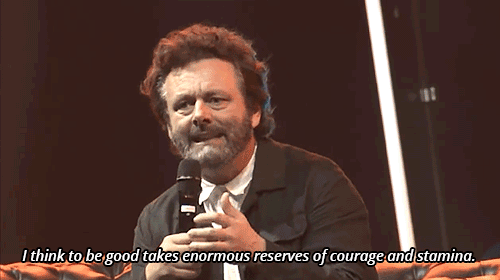
We as a society tend to sort of undervalue goodness. It’s sort of seen as sort of somehow weak and a bit nimby and “oh it’s nice.” And I think to be good takes enormous reserves of courage and stamina. I mean, you have to look the dark in the face to be truly good and to be truly of the light…. The idea that goodness is somehow lesser and less interesting and not as kind of muscular and as passionate and as fierce as evil somehow and darkness, I think is nonsense. The idea of being able to portray an angel, a being of love. I love seeing the things people have put online about angels being ferocious creatures, and I love that. I think that’s a really good representation of what goodness can be, what it should be, I suppose.
I was looking forward to BAMF!Aziraphale all season long, and I think that’s what we got in the end. Remember Neil said that the Job minisode was important for Aziraphale’s story. Remember how Aziraphale sat on that rock and reconciled to himself that he MUST go to Hell, because he lied and thwarted the will of God. He believed that––truly, honestly, with the faith of a child, but the bravery of a soldier.
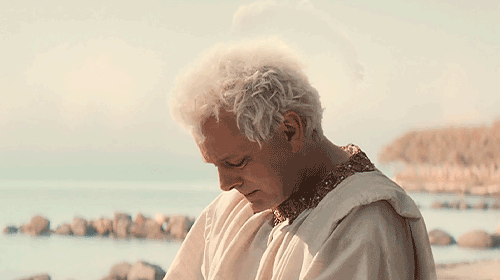
Aziraphale, a being of love with more goodness than all of Heaven combined, believed he needed to walk through the Gates of Hell because it was the Right Thing to do. (Like Job, he didn’t understand his sin but believed he needed to sacrifice his happiness to do the Right Thing.)
That’s why we saw Aziraphale as a soldier this season: the bookshop battle, the halo. But yes, the ending as well.
Because Aziraphale never wanted to go to Heaven, and he never wanted to go there without Crowley.
But it was Crowley who taught him that he could, even SHOULD, act when his moral heart told him something was wrong. While Crowley was willing to run away and let the world burn, it was Aziraphale (in that bandstand at the end of the world) who stood his ground and said No. We can make a difference. We can save everyone.

And Aziraphale knew he could not give up the ace up his sleeve (his position as an angel) to talk to God and make them see the truth in his heart.
I was messed up by Ineffable Bureaucracy (Boxfly) getting their happy ending when our Ineffable Husbands didn’t, but I see now that them running away served to prove something to Aziraphale. (And I am fully convinced that Gabriel and Beelzebub saw the example of the Ineffables at the Not-pocalypse and took inspiration from them for choosing to ditch their respective sides)
But my point is that Aziraphale saw them, and in some ways, they looked like him and Crowley. And he saw how Gabriel, the biggest bully in Heaven, was also like him in a way (a being capable of love) and also just a child when he wasn’t influenced by the poison of Heaven. Muriel, too, wasn’t a bad person. The Metatron also seemed to have grown more flexible with his morality (from Aziraphale's perspective). Like Earth, Heaven was shades of (light?) gray.
Aziraphale is too good an angel not to believe in hope. Or forgiveness (something he’s very good at it).
Aziraphale has been scarred by Heaven all his life. But with the cracks in Heaven’s armor (cracks he and Crowley helped create), Aziraphale is seeing something else. A chance to change them. They did terrible things to him, but he is better than them, and because of Crowley, he feels ready to face them.
(Will it work? Can Heaven change, institutionally? Probably not, but I can't blame Aziraphale for trying.)
At the cafe, the Metatron said something big was coming in the Great Plan. Aziraphale knows how trapped he had felt when he didn’t have God’s ear the first time something huge happened in the Big Plan. He can’t take a chance again to risk the world by not having a foot in the door of Heaven. That’s why we saw individual human deaths (or the threat of death) so much more this season: Elspeth, Wee Morag, Job’s children, the 1940s magician. Aziraphale almost killed a child when he couldn’t get through to God, and he’s not going through that again.
“We could make a difference.” We could save everyone.

Remember what Michael Sheen said about courage and doing good––and having to “look the dark in the face to be truly good.” That’s what happened when Aziraphale was willing to go to Hell for his actions. That’s what happened when he decided he had to go to Heaven, where he had been abused and belittled and made to feel small. He decided to willingly go into the Lion’s Den, to face his abusers and his anxiety, to make them better so that they would not try to destroy the world again.
Him, just one angel. He needed Crowley to be there with him, to help him be brave, to ask the questions that Heaven needed to hear, to tell them God was wrong. Crowley is the inspiration that drives Aziraphale’s change, Crowley is the engine that fuels Aziraphale’s courage.
But then Crowley tells him that going to Heaven is stupid. That they don’t need Heaven. And he’s right. Aziraphale knows he’s right.
Aziraphale doesn’t need Heaven; Heaven needs him. They just don’t know how much they need him, or how much humanity needs him there, too. (If everyone who ran for office was corrupt, how can the system change?)
Terry Pratchett (in the Discworld book, Small Gods) is scathing of God, organized religion, and the corrupt people religion empowers, but he is sympathetic to the individual who has real, pure faith and a good heart. In fact, the everyman protagonist of Small Gods is a better person than the god he serves, and in the end, he ends up changing the church to be better, more open-minded, and more humanist than god could ever do alone.
Aziraphale is willing to go to the darkest places to do the Right Thing, and Heaven is no exception. When Crowley says that Heaven is toxic, that’s exactly why Aziraphale knows he needs to go there. “You’re exactly is different from my exactly.”
____
In the aftermath of Trump's election in the US, Brexit happened in 2018. Michael Sheen felt compelled to figure out what was going on in his country after this shock. But he was living in Los Angeles with Sarah Silverman at the time, and she also wanted to become more politically active in the US.
Sheen: “I felt a responsibility to do something, but it [meant] coming back [to Britain] – which was difficult for us, because we were very important to each other. But we both acknowledge that each of us had to do what we needed to do.” In the end, they split up and Michael moved back to the UK.
Sometimes doing the Right Thing means sacrificing your own happiness. Sometimes it means going to Hell. Sometimes it means going to Heaven. Sometimes it means losing a relationship.
And that’s why what happened in the end was so difficult for Aziraphale. Because he loves Crowley desperately. He wants to be together. He wanted that kiss for thousands of years. He knows that taking command of Heaven means they would never again have to bow to the demands of a God they couldn’t understand, or run from a Hell who still came after them. They could change the rules of the game.
And he’s still going to do that. But it hurts him that he has to do that alone.
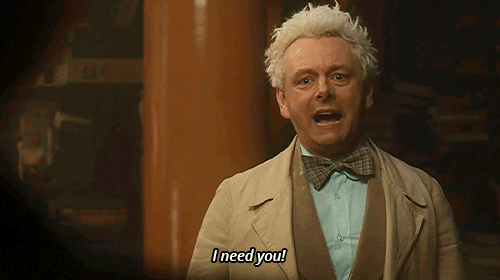
#good omens#good omens 2#ineffable husbands#it's kinda like capt america: civil war#with Azi as Tony Stark: traumatized and trying to do the right thing#and Crowley being Steve Rogers: fuck the establishment let's go rogue#gos2spoilers#good omens meta#good omens 2 meta#go s2#michael sheen#go s2 meta#go meta#*mine#*mymeta#ineffables husbands#ineffable soulmates#*mybest
11K notes
·
View notes
Text
Tony Stark’s repeated shoulder injuries could mean that he holds his shoulder all wrong. Meaning he built the suit to conform to a body that’s not positioned healthily. Meaning, maybe he refused treatment for his left arm about it would mean having to never wear his old suits again without messing up the injury again. and having to work out angles of repulsers and shifting gears all over again.
126 notes
·
View notes
Note
I don't think you've been asked- but what's your opinion on the accords?
I briefly touched on the accords here, in my post where I hate on Steve.
Now, I have to give the caveat of "in the MCU films" as that's what I'm familiar with and if I don't someone will invariably come to my comments and say, "But Muffin, you didn't read the comics, in the comics this made sense, in the comics this is different".
So, we're talking about the films.
In the films, they were a completely reasonable and legitimate international law that Steve and friends look... not quite bad but short sighted for fighting against it so hard.
Given what we're told in the film, this is an international agreement, agreed upon by pretty much every country, which is just "superhumans who play vigilante should be held accountable to international laws and should not be directing themselves". That's it.
The laws in and of themselves are not only not an inherently bad idea but probably a good one. The reason it seems they may not be justified is that, thus far (sans Tony in Age of Ultron when he made an evil AI and nearly destroyed a country), is that the Avengers as we've seen them in the film have reacted reasonably to threats and were unquestionably the good guys. They never threw their weight around, abused their powers, didn't seem to be picking and choosing of who they would save and who they wouldn't, and worked fairly cohesively as a relatively independent organization. This makes it seem more like a "Tony" problem in that he's the one who fucked up big time and should have had oversight.
The problem is, that's right, it is a Tony problem, Tony was an Avenger who had no oversight and was deciding where and how he should use his talents with no one to say "no", and there could be another Tony in the future and maybe someone should be able to check in and say when the Avengers should and should not be going.
Now, if it was just MCUsa, e.g. Ross who we know is a baddie, that'd be quite bad as the avengers can be sent out as tools of war between whatever countries except that we're told it's explicitly an international agreement and that it's internationally decided on when and where the Avengers should be deployed. In terms of politics, that's about as good as you're going to get, and a lot more justified than "six/seven people with mostly the same background decide when and where they should go without necessarily having a full understanding of the situation/place they're being deployed into".
Oversight is not a bad thing.
And the film completely and utterly fails to bring up any legitimate and convincing arguments against it. Arguments seem to boil down to: we as an audience know from general Marvel things and The Hulk that Ross is very bad and him being for the accords is bad, Tony was the bad guy in the last film and is clearly letting his fear get to him here and is afraid of making his own decisions, Bucky, and we know the Avengers are good and always will be.
It's just.. yeah, what else is there to say?
#mcu#mcu meta#mcu headcanon#the accords#steve rogers#anti steve rogers#captain america#anti captain america#tony stark#iron man#captain america civil war#meta#headcanon#opinion
37 notes
·
View notes
Note
How was Iron Man thought of by comics readers, before the movie? I've heard different takes, from him being despised to being generally popular.
This is one of those that really changes depending on the era you're talking about. It is true that, overall, Iron Man was not a particularly well-loved or important character before the movie.
Indeed, I would argue he was kind of the bottom of the C-tier. Yes, he was a founding Avenger and he had some solo stories people liked, but he also fucked off out of the Avengers after #16 (because of a weird Stan Lee idea), and wound up leading the West Coast Avengers who were sort of an in-universe joke, very much the also-rans to the Avengers (who weren't particularly that big either). There was likewise a running gag about villains finding it embarassing to lose a fight to "Old Shellhead."
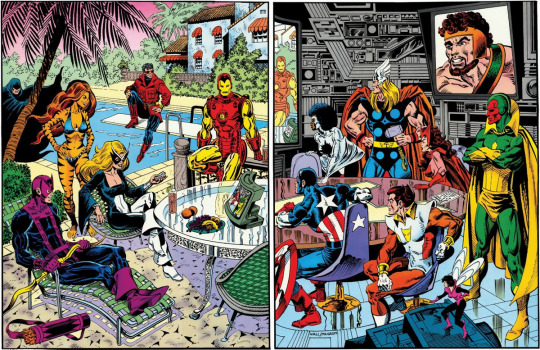
But he wasn't despised, just kind of inessential and overshadowed by more prominent heroes. This would change in 2002 with the creation of the Ultimates and the Ultimate Universe.
Now, I fucking hate Mark Millar's work, but credit where credit is due: he made Tony Stark a main character when he had not been one before, and the movie would not have happened without his inspiration (although I'd argue there was a lot of sifting the pure from the dross on that one).
One of the ironies of the MCU, though, is that it got its liftoff from Iron Man just at the point where the comics had reached Peak Tony and fans really turned against him during Civil War. Mark Millar might have thought that the Pro-Registration side was self-evidently in the right, but no one agreed with him - especially once he started building interdimensional black site prisons for superheroes, recruiting supervillains to work for the government, and creating a murderous Thor clone. Not only did the fans hate him, but pretty much all of his old friends now considered him a traitor - and Marvel pretty much had to kill Tony and replace him with a pre-fash AI backup, then have Tony be the leader of the "good" side in Civil War II, to deal with the backlash.
(Incidentally, I would argue that Hickman's Avengers run did a way better job with Millar's concept than Millar ever could.)
This is why Captain America: Civil War ended up being a second take for the concept, where both sides were depicted as more reasonable in their motivations and actions than in the comics that inspired the movie, and then Infinity War and Endgame recontextualized Tony as a tragic character who ultimately managed to redeem himself with a heroic sacrifice. (Although since then, they really have gone too far with his canonization.)
55 notes
·
View notes
Text
I just remembered both Tony and Loki figured out time traveling on their own to save others. Tony with science and Loki with magic. Something something science fiction, storytelling, parallels and frostiron.
#i can't write coherent meta at the moment#i'm too exhausted#loki series#endgame#loki#tony stark#frostiron
50 notes
·
View notes
Text
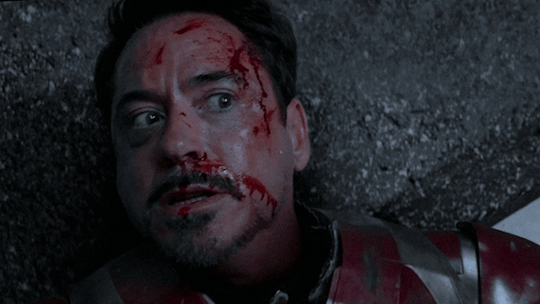
tony's been on both sides of the ultra-specific situation of confronting mortality on the ground, towered over by a friend, and wondering if this is it. if that's the last face they'll ever see.
tony and steve.
peter and tony.
but in the face of possible death, tony and peter were nothing alike.
the discomfort of facing a death caused by someone you're supposed to trust versus the comfort of departing in the presence of someone you love.
the shame of allowing someone you admire to witness your weakness versus the regret of showing them your pain.
the last defiant act of accepting your faith, maintaining eye contact, and daring them to do it versus trying to fight your destiny, looking away, and apologising for not being able to stay.
the millisecond of disappointment when you realise you'll survive versus the millisecond of utter misery when you realise you won't.
tony got up both times, and life went on.
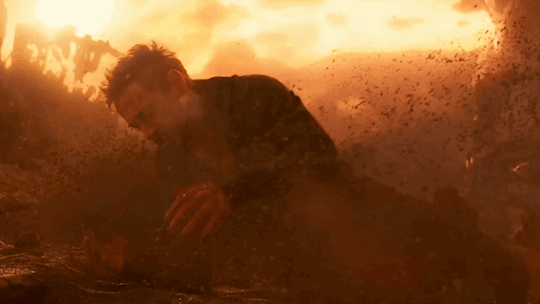
marvel parallels 13/?
robert downey jr and tom holland in captain america: civil war (2016) and avengers: infinity war (2018)
#NOT anti steve rogers#marvel parallels#irondad and spiderson#gifs by soliloquent#tony stark meta#peter parker meta#tony stark#peter parker#iron man#spiderman#rdj#tom holland#tony stark gif#peter parker gif#captain america civil war#avengers infinity war#peter parker and tony stark#mcu gif#marvel gif#avengers#avengers gif
748 notes
·
View notes
Text
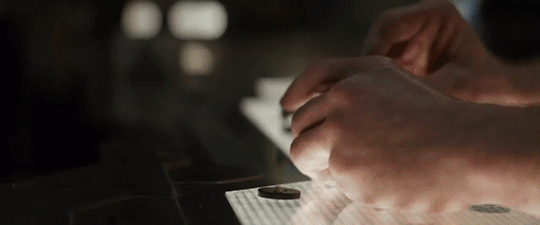
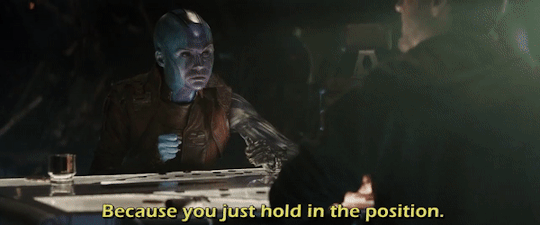

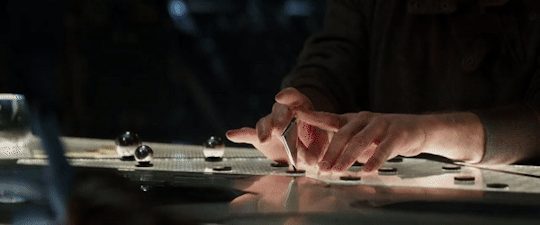
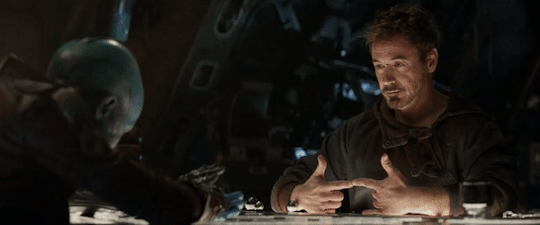

So, this truly a great scene. The entire opening of Endgame is, in my opinion is fantastic because it really gets the characters. It fully understands what made Tony so intriguing in the first place. How he survives through connection with others and humor. It's not so much Tony making jokes to avoid reality, but him using wit to take what little control he can over the situation. And what's so great about the paper football scene specifically is seeing that humanity in Tony. Not only trying form a connection, but we see him show some genuine empathy. This whole thing is for fun, but he clearly sees a win is what Nebula needs.
Nebula, someone who presents herself so tough and angry all the time this is a great scene showing a quit vulnerability. Just playing a game is something she's never done, but she's trying so hard. She might have patched things up with her sister but being shown kindness and friendship are still such foreign concept to her she doesn't know how to react. Tony makes an effort to be nice and Nebula does repay that kindness both in turning down rations and placing a jacket on Tony when it seems like it's the end.
Both RDJ and Karen Gillan absolutely killed it.
What I find so frustrating is that there much about Endgame that annoys me, and I think is just terrible. I hate the endings they give to so many characters, I don't like so many of the tropes used and just the treatment of some characters is just insulting. I hate that the directors and writing show how competent they can be in the opening only to fumble it so hard elsewhere throughout the rest of the movie.
61 notes
·
View notes
Note
Do you take Howard’s age and upbringing into consideration when you criticise him? I feel like most people are missing the point. He wasnt an involved father but neither was my dad and many fathers. It’s unfortunate but it’s the truth. A Father’s role consisted of providing and protecting their families and Howard did just that. His abuse was negligence and most fathers are guilty of that especially older generations. Howard is conservative in a traditional sense as we saw him call out for Maria to pick Tony. Does that mean he hates Tony or wanted to inflict pain? No. Just different times, I bet all of the superheroes had terrible fathers. Tony should understand/know how patriarchal society is.
ah so we should excuse Howard of child neglect and abuse bec he's from a different time and apparently fathers don't provide emotional support, either?
a father is supposed to do more than provide monetary support or protection. clearly he didn't protect him TOO much considering he was BFFs with Obiadiah Stane lol
howard doesnt get to clap himself on the back for the bare minimum he provided OR for anything Tony does with his life. he did the absolute bare minimum of keeping him fed, clothed and sheltered
babe idc if Howard wasn't intentionally harming Tony. Trauma was the impact of his shitty parenting, sorry. Tony seems perfectly capable of providing the emotional care and support and love with Morgan from the little screen time we see of them. I'm not going to give Howard a pass bec "patriarchy"
#no hate or anything but im kinda tired of how many fictional fathers are excused for being shitty parents#the takes ive seen about fathers across multiple fandoms just drive me nuts#tony stark meta#tony stark#anti howard stark
35 notes
·
View notes
Text
Ross’s quote about the Avengers ignoring sovereign borders comes up a lot and is often used to accuse Steve of American imperialism, so let’s have a look into it.
You've fought for us. Protected us. Risked your lives. While a great many people see you as heroes. There are some... who would prefer the word "vigilantes". What would you call a group of US-based, enhanced individuals, who routinely ignores sovereign borders and inflict their will wherever they choose and who, frankly, seem unconcerned about what they leave behind them?
Sooo. Civil War was a terrible piece of world-building. The first problem is that it came way too early in the franchise, not just for the fracture between Tony and Steve to be anywhere near meaningful, but also the number of missions preceding this that would actually fit Ross’s accusations.
Let’s look at all the MCU movies so far leading up to Civil War:
Iron Man 1-3
Captain America 1-2
Thor 1-2
Ant-Man
Avengers 1-2
Hulk
(Guardians of the Galaxy)
Cap 1 took place in WW2, Cap 2 took place mostly on US soil, with the exception of the Lemurian Star which was a SHIELD mission. Thor wasn’t part of Civil War but he was dealing with extraterrestrial threats that came to Earth. Avengers 1 similarly - the only time the team was out of US was to confront Loki in Germany, and again that was under the supervision of SHIELD. Ant-Man also happened in US territory.
The only person on the team who “routinely ignores sovereign borders and inflict their will” without any oversight was Tony. He did it in IM1 against the Ten Rings. In IM2 he opens the movie with:
I'm not saying that the world is enjoying its longest period of uninterrupted peace in years because of me (...) I’m not saying that Uncle Sam can kick back on a lawn chair, sipping on an iced tea because I haven’t come across anyone who’s man enough to go toe-to-toe with me on my best day.
It is implied - the showing was done in the first movie - that Tony continued his "peace-keeping" activities which consisted of zipping into other countries and blasting everything with fire.
Never forget that even Rhodey assessed Tony as:
As he does not operate within any definable branch of government, Iron Man presents a potential threat to the security of both the nation and to her interests.
Operating outside the law was started by Tony, not by Steve or any of the other (original) Avengers, most of whom were working for SHIELD until they had to bring it down themselves to stop Hydra from killing millions of people.
The narrative problem lies in the vacuum between Captain America 2 and Captain America 3. Avengers 2 deftly avoided discussing who was overseeing their operations, and by the time Cap 3 rolls around they're suddenly a privately operated group of vigilantes?
Speaking of Avengers 2, that's the time someone decided to make a “global peacemaking initiative” without involving his team, much less the global community.
Bruce Banner: So you're going for artificial intelligence and you don't want to tell the team.
Tony Stark: Right. That's right, you know why, because we don't have time for a city hall debate. I don't want to hear the "man was not meant to meddle" medley. I see a suit of armor around the world.
Tony knew the ethical implications and the risks of this but forged ahead anyway. Said murder-bot went all over the world intent on human extinction while the Avengers tried to chase him down. We can argue over whether it was appropriate for Avengers to intervene with Ultron before waiting for the UN to have their emergency committee hearing in 3 days, but I think the key is the Avengers risked their lives to tidy up Tony's their own mess, which is what accountability and dealing with the consequence is all about.
And that's the crux of Steve's argument, which I think a lot of people gloss over.
We are (giving up) if we're not taking responsibility for our actions. This document just shifts the blames.
The Accords passes the buck upwards to the UN…this means both the decisions and the responsibility for the decisions go elsewhere. The situation that riled Tony up in the first place was a mother telling him “I blame you” for Sokovia. Assuming we ignore Tony’s role in creating Ultron, how would oversight have changed the situation? They wouldn’t have been able to create Vision off the cuff, nor would they have been allowed to recruit the twins. The people in Sokovia? Would still have died, and likely far more of them because of a slower response.
But what Tony is saying is if they had oversight, the mother wouldn’t have marched up to him and blamed him. Or as Steve points out, he could shift that blame onto the UN.
Steve’s version of accountability is about taking ownership of their mistakes and finding a solution. Tony’s version of accountability is having someone else make the call and take the blame. (* I feel like this is a thing a lot of people - often young - get confused about. Accountability isn’t just about having someone telling you what to do. Some people and some organisations find themselves in the rare position of having no direct oversight, but they still need to have accountability measures in place - look at the UN Charter for example)
Going back to my original point, the only one shown to routinely ignore sovereign borders and inflict his will wherever he pleases was Tony. The one operating outside government sanction for the majority of his appearances was Tony. The one actively seeking out “criminals” and trying to “win a war before it starts” has always been Tony. Tony might not be the one wearing the red white and blue but he’s the only one gloating about having done the job for “Uncle Sam”. The greatest advocate for American imperialism was Tony, not Steve.
532 notes
·
View notes
Text
thinking about percy jackson and peter parker
what if peter was never bitten by a spider? what if he was the son of arachne, and the only reason he's never had a run in with monsters is because his mother, herself, was a monster? a child of a monster who becomes a hero.
even if he made it to camp, how would that work with being spiderman? there would be no cabin to claim him, no god to pray to - he's smart enough to be an Athena kid, but the athena kids get agitated and wary just from being a few feet away from him, and they send off the smallest tingle in his spidersense. nobody considers he could be the kid of a monster, not a demigod in definition, but still mythical.
how would the other kids react? he's a child of a monster, and they all have traits from their godly parent. was peter destined to be a monster? sins of the mother, nature vs nurture and all that?
idk. just read The File by denimbeans (ao3) and now my brain is running on fumes. just interesting to me
#spiderman#peter parker#marvel#mcu#rant#meta? maybe?#percy jackson#pjo#percy jackon and the olympians#crossover#marvel and percy jackson#SO many ideas#too many#and of course tony could be like a descendant of hephaestus (howard stark was most certainly a hephaestus kid)
24 notes
·
View notes
Note

🙄🤦
I definitely agree, such a take is very frustrating.
The biggest flaw in the argument is the assertion that "There's no physical threat," in the final battle of Civil War, for Tony was very much a physical threat. He was definitely going all-out in his attempts to murder Bucky. And while he wasn't specifically trying to kill Steve, he also wasn't trying not to; there were even times where he seemed to forget that Steve was not his primary target. So both Steve and Bucky could easily have been killed during Tony's assault, especially since they continuously held back toward him even though he wasn't holding back toward them.
Indeed, there were numerous points at which Steve and Bucky could have died. For example, near the beginning of the fight, Tony literally tried to missile Bucky in the face. This undoubtedly would have killed Bucky if he had not reacted in time. And while Bucky did manage to turn it aside, the redirected missile caused a section of the building to collapse, which put both him and Steve in great danger of being crushed to death by the falling debris. Steve had been trapped in ankle-cuffs that Tony had put on him, near the place where the missile ended up, so he would have been in big trouble had he not been able to get free: and Bucky was being held in the air by Tony, who was too busy beating Bucky up to notice the destruction, and so dropped him after getting hit with some falling debris, just thankfully not in the path of any of the wreckage. Tony had not been in much danger because he had the protection of his suit, but Steve and Bucky's survival was just a matter of luck.
Also, when Bucky was trying to climb out of the bunker, Tony tried to aim another missile at him, and Steve was unable to stop this as Tony knocked away his shield. The only reason Tony did not successfully hit Bucky is because the damage Steve previously inflicted on his suit ended up affecting his targeting system, and since Tony is used to relying on that, his aim isn't very good: so he missed Bucky and hit the missile silo lid's support system instead. But if his targeting system had been intact, Bucky would not have been so fortunate.
And of course, there is that memorable moment where Tony prepared to knock a bloody, injured Steve out of the bunker and down the mountain, which Steve may or may not have survived. The only reason Tony didn't do it is because Bucky grabbed his leg at that moment, so he turned and kicked Bucky in the head with his metal boot instead. It's a really good thing Bucky is a supersoldier, because otherwise such a blow could have inflicted grave damage.
And those instances are just the major highlights of how Steve and Bucky narrowly escaped death during Tony's assault. There are multiple other points at which they could have been killed.
It's also worth noting that a major part of the reason Steve and Bucky managed to stay alive is simply that they are supersoldiers. This meant that they had the brute strength to both fend off some of Tony's attacks which might have otherwise landed, and continuously damage his armor to gradually impair his ability to inflict harm on them. They also had the ability to take a punishing amount of damage without it being lethal. Had they been normal humans, they might not have been able to force Tony's attacks to miss given that the suit lends him extra strength: and they certainly would have a lot more difficulty damaging Tony's suit. This would allow Tony to go at them indefinitely, which would be bad news since there is only so much damage that normal humans can take.
In other words, Steve and Bucky didn't survive because of any lack of effort to kill them on Tony's part, they survived because they were hard to kill and had the means to fight back. If either Steve or Bucky had been a normal human, they probably wouldn't have survived.
Some people erroneously take the outcome of a fight as proof that there was no danger during the fight. One example of this would be the Dora Milaje fight in The Falcon and the Winter Soldier. People will say that the Dora Milaje weren't fighting to kill because they didn't kill anyone, when the fact that they didn't kill anyone is just luck. There were several strikes they made that would have been lethal had they landed; it just happened that these were all stopped. This is the trend that the above example demonstrates. People will say that no one was in any danger during the Siberia fight because everyone survived, when the reality is that Tony was actively trying to kill Steve and Bucky, and nearly succeeded multiple times. And while both Steve and Bucky survived, that was by no means the guaranteed outcome; they really had to work to stay alive, and even with that effort both of them ended up badly injured.
I do agree with the response, however. The originally planned ending of Civil War would have been a lot better than what we got. There would have been a lot more emotional stakes in that situation, for example, as there would be both the Avengers once again working as a team after they had been divided, and Bucky fighting people he had a history with. That is much more emotionally compelling than Tony mercilessly trying to kill both Bucky, for something that was very clearly not his fault, and Steve, for trying to protect Bucky. There are no emotional stakes in such a fight, that is simply Tony being monstrous.
The original final battle would also be a better way to wrap up a movie that was supposedly about the Accords. As it was, the final battle had literally nothing to do the Accords, which sort of calls into question what the point of most of the rest of the movie was. It also prevented Tony's supposed support of the Accords from being challenged, as since the Accords were forgotten for the duration of the battle, he never had to reckon with breaking them. But if the Avengers had to band together to fight the supersoldiers, it would force Team Iron Man to confront the fact that if they had waited to see if the UN would let them go (which it might not have), the supersoldiers would have been able to escape and wreak havoc. Such a situation would also give the Avengers a concrete example of why the Accords are problematic, which would help to get the Accords abolished much more quickly. That is really what should have happened; at the very least, Team Cap should have had a clear victory at the end of what was supposed to be a Captain America movie.
So yeah, the original ending would have been much better. The only thing against it is that it is not really a fitting end to a Captain America movie: but since the one we got wasn't either, and the entire film would have to be majorly reworked in order to make it a Captain America movie in more than just name, that is not a very big loss. Indeed, the first ending might even have pushed Civil War slightly more towards being an Avengers movie rather than an Iron Man movie, which would at least be somewhat beneficial.
101 notes
·
View notes